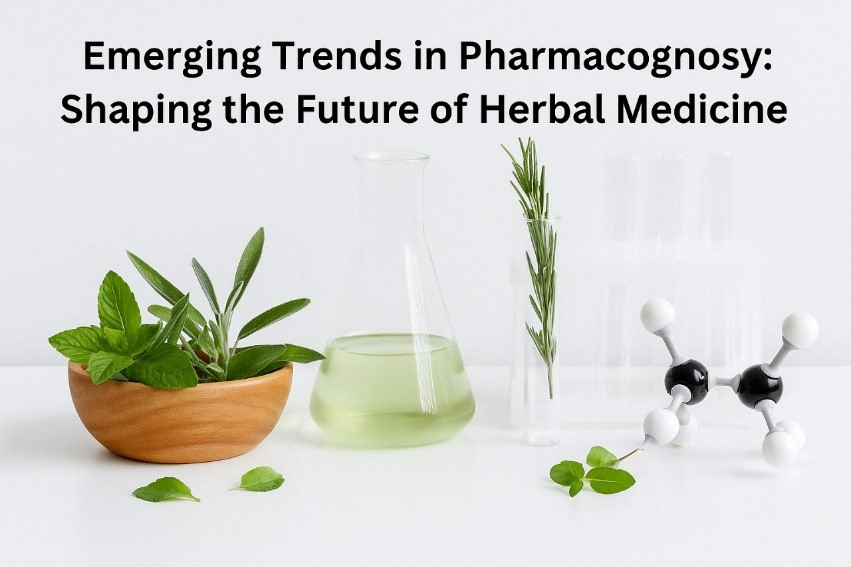Ms. Ekta
Assistant Professor, Department of Pharmacy, School of Health Sciences, Sushant University, Gurugram
Introduction
Pharmacognosy, the branch of pharmaceutical sciences that focuses on the study of natural products, especially those derived from plants, has experienced a remarkable resurgence in recent years. With growing global interest in natural and holistic approaches to health, herbal medicine is re-emerging as a cornerstone of primary healthcare systems, especially in developing countries. This blog delves into the most significant emerging trends in pharmacognosy, examining how they are shaping the future of herbal medicine in both academic and clinical settings.
Integration of Phytochemistry with Advanced Analytical Techniques
Modern pharmacognosy has evolved beyond basic analyses, with advanced tools like LC-MS, GC-MS, and NMR spectroscopy revolutionizing phytochemical investigations. These technologies enable precise identification and quantification of bioactive compounds, while metabolomics helps explore complex plant matrices, revealing the synergistic effects of multiple phytoconstituents in herbal medicine.
Ethnopharmacology and Community-Based Drug Discovery
Ethnopharmacology bridges traditional healing practices and modern drug discovery, with researchers using ethnopharmacological leads to identify novel therapeutic agents. Field studies and collaborations with indigenous communities are crucial for cataloging local medicinal plants, preserving cultural heritage, and advancing scientific knowledge.
Molecular Pharmacognosy and Genomic Approaches
Molecular biology is transforming pharmacognosy, with DNA barcoding ensuring herbal material authenticity, while genomic and transcriptomic studies reveal plant biosynthesis of secondary metabolites. Tools like CRISPR-Cas9 and gene expression profiling allow researchers to enhance biosynthetic pathways, promising more standardized and potent herbal formulations.
Nano-Phytomedicine: Enhancing Efficacy and Bioavailability
A long-standing challenge of herbal medicine poor solubility and bioavailability can be addressed through nanotechnology, with nano-formulations like liposomes and phytosomes improving solubility, stability, and targeted delivery, such as enhanced curcumin performance in nano-form for better anti-inflammatory effects.
AI and Machine Learning in Herbal Drug Research
AI and ML are transforming herbal pharmacology by predicting biological activities, optimizing extraction methods, and uncovering novel phytochemical combinations, while network pharmacology accelerates drug discovery by exploring the multi-target, multi-component nature of herbal drugs.
Sustainable Cultivation and Conservation of Medicinal Plants
As demand for herbal products rises, pharmacognosy focuses on sustainable harvesting, in-vitro conservation, and biotechnological propagation methods like tissue culture and micropropagation to protect biodiversity and ensure the preservation of natural plant populations.
Personalized Herbal Medicine
Advancements in pharmacogenomics and nutrigenomics are enabling personalized herbal treatments, aiming to tailor safer, more effective formulations by combining individual genetics with traditional systems like Ayurveda and molecular diagnostics for better therapeutic outcomes.
Regulatory Frameworks and Standardization
Herbal medicine’s global credibility depends on standardization and regulation, with organizations such as WHO, EMA, and FDA establishing quality and safety guidelines through GACP, GMP, and pharmacopoeial standards.
Digital Herbariums and AI-Driven Plant Identification
Digital herbariums and AI-powered image recognition tools are revolutionizing plant identification, enhancing field research efficiency and accessibility through mobile apps for students, researchers, and practitioners.
Interdisciplinary Collaborations and Globalization
The future of pharmacognosy hinges on interdisciplinary collaboration and global innovation, integrating herbal medicine into mainstream healthcare worldwide.

